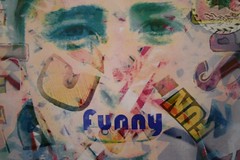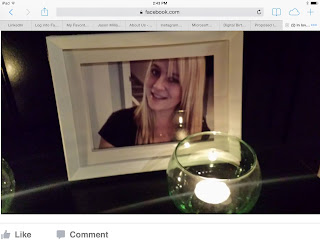This past Sunday I celebrated my birthday. In case you
were wondering, it was my 39th birthday, again. By about mid-afternoon, I
had 61 birthday congratulations, and by the next day the number had risen to
79. Regardless about whether or not you think this is a high or low number, or
that you can't believe I'm still on Facebook - it's pretty cool to think that
with a click people could reach out and wish me well. Did it mean something to
have colleagues, friends, family, old teachers, and even old boyfriends congratulate me on my birthday?
Actually it was kind of nice knowing that people took the time to post, even if
it took them only 10 seconds to do it.
So
how does celebrating my birthday connect to my online identity? These people
who took the time to connect are my family and friends on or offline. There is no separation. Getting a birthday
greeting from a person that I know mainly from online interactions, means as
much as those people I knew first face-to-face. Receiving a birthday message
via Facebook almost means as
much as a card (whether it is digital or paper). I say almost, because honestly it takes under a
minute to post a comment on Facebook, whereas sending a card takes a lot
longer.
 |
| My About Me page captures part of my online identity |
So
if this is how people get to know us on-line, this edited version of
ourselves, how well do they really know us? The truth is, how well
does anyone really know us? Don't we all project an edited version of ourselves
outside of our homes? Hasn't that public image of ourselves always been an edited version and it's not
just Social Media that is totally changing things? Or is our online identity edited more than we realize?
 |
 |
| |
Although
Social Media does not always truly represent our whole selves, it does
represent at least a part of us. And sometimes a fragment is enough, especially if that is all that's left when a
person dies. Over three years ago, my cousin Stephanie died in a car accident.
She was a very social girl whose life and relationships were all well marked on
Instagram and Facebook. After she died, we didn't just reminisce and share our
stories and memories, we traveled down her timeline, mapping out her life just
hours before she died. Maybe this sounds morbid. Alright, I know it does. By
exploring the timeline, my sisters and I could examine her last days, so we
could see how she was and what was going on. Facebook
allowed us to see more. Her Facebook identity, bent or fractured, let me get to know my
cousin again. In being able to journey the timeline, we were able to see that she was happy.
Of course we didn't know if she was really
happy. Did it make a difference in the
end? Nope. But, it did made us feel better
to connect with her one last time. It was like we were watching the last
moments of her life before she died and making a final connection. Maybe this
sounds weird. Ugh, it's hard to explain.
Shortly after she died, my aunt was able to take over her
Facebook page (see Facebook form "Special Request for a Deceased Person's Account"), her
Facebook site was "memorialized",
which meant that it was deleted or left unchanged after the reported
death, and a memorial page went
up. Did the group help my aunt with her
grieving? Yes. Judging by the pictures and prayers that my aunt has posted over
the past 3 years, it has solidified her relationship with my cousin's closest
friends. Instead of sad or awkward "run-ins" they are able
to still connect, evident by the posts and pictures. As Joshua Andrew
shares in his article, "How
We Grieve on Social Media", Facebook helped
her with her grieving process by solidifying that community, so she had a place
where she could connect with a multitude of people so she never felt alone. How
we grieve can be considered different in the social networking realm than how
we may interact face to face. According to an article from CBC, "The Online Life After Death", because of social media, discussing the grief of a
loved one "even months after a death was acceptable in the social
networking realm, particularly among friends who do not live in the same
city". It was also noted in the article, that there needs to be a
connection between the family and the digital community when someone dies. If a
family doesn't connect with the deceased person's online life, the digital
community has nowhere to grieve. And in reality, this might be the only way
those separated by distance can actually find out about the death.
On the flip side, sometimes you don't want to remember or
connect again and again through all the updates. When the memorial page was
created, along with grieving friends and family, I posted a memory and joined
the Stephanie's Memorial group. In joining the group, I got every single update
to my cousin's site. At first I didn't mind. It was nice to come together as a
community... remember and read all the different memories and prayers. At first I
didn't mind - later I felt conflicted. For the next few months, the updates
went on. I stopped checking out every update, not because I didn't care, but
because I needed to
stop thinking about her death. Just as in
Julie Buntin's article, "She's
Still Dying on Facebook", with every picture, prayer, memory, or
update I was reminded. After a while I needed
to stop remembering, yet I felt too guilty to stop following the group. I
know, this probably sounds a bit selfish, but it's part of how I grieve.
If
you are interested in learning more about Facebook's new policy of allowing one
more post after you die, take a look at this article from Time Magazine, "Here's What Happens to
Your Facebook Account After You Die" by Jack Linshi.
When
I think of how our lives and identity are shaped online, it's not just a
footprint that we are creating. As people around the world are sharing their
lives in this space, all of this will stay forever. The information, which
helps to form our identity, is going to become a digital archive that shapes
who we were. All it would take for future historians and paleontologists is to
analyze the digital data to get a sense of what our lives were like. In Adam
Ostrow's TED Talk, "After
Your Final Status Update", he reminds us of this very fact, "... today we're all creating this incredibly rich digital
archive that's going to live in the cloud indefinitely, years after we're gone."
How will this archive of information be used? What will we look like to
our future children? Will we appear like people who craved social
interaction so much, that face to face wasn't enough? Or will we seemed like
individuals who needed to share every social interaction and thought? In any
case with all the fragments, historians will have first-hand
accounts which will help tell the story of who we were. Bent or fractured, it
will be more information than what has ever been left previously by past
generations.



Thanks for posting Jenn, I really enjoyed reading this! I often think about how well people really know us and how well we really know them online. I know there are people who I am ffriends with and they don't have their birthdays posted and I don't know their birthdays. Now do I know everyone's birthday in my extended family? No I don't...I have a big extended family. But I hope you get the point I'm trying to make. I know that I portray myself differently online than in my real life. There are a variety of reasons why I portray myself online the way I do. That being said, I don't think we really know anyone truly by being ffriends. But that doesn't mean that we know our friends and family in real life any better. People will always hide what they don't want others to know and some people can be very good at hiding things. If we only know someone through online connections, our knowledge of them will probably be much more augmented then if we connected with them in real life on a daily basis.
ReplyDelete